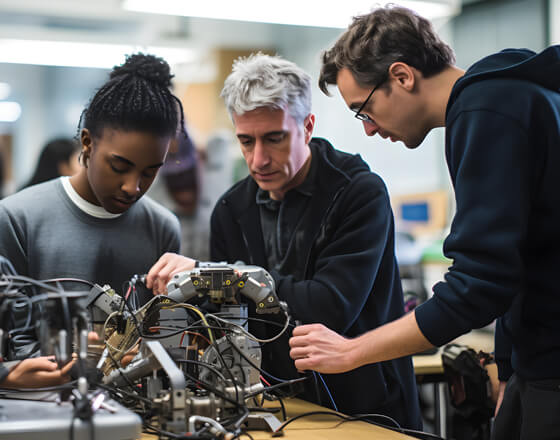Unlock Your Learning Potential:
Mastering Metacognition for Academic Excellence and Lifelong Success
Metacognition is the key to academic and life success. By being aware of your own thoughts, understanding your strengths and weaknesses, and utilizing the best strategies for different tasks, you can excel in all areas of learning. It’s not just about completing assignments or exams; it’s about truly knowing yourself as a learner. Take action now and implement metacognitive strategies into your daily learning routines.
Benefits for Developing Metacognition
Enhanced Learning Strategies
Metacognition empowers individuals to choose and apply the most effective learning strategies for different tasks. By reflecting on their cognitive processes, students can identify which methods work best for them. This awareness leads to improved comprehension, retention, and application of knowledge.
Improved Problem-Solving
Metacognitive skills enhance problem-solving abilities by promoting a reflective approach. Individuals with strong metacognition can analyze problems, identify potential obstacles, and adjust their strategies accordingly. This adaptability is crucial for navigating complex challenges in real-world settings.
Increased Motivation & Goals
Self-awareness through metacognition contributes to increased motivation. By monitoring their progress and setting realistic goals, students remain motivated in their academic pursuits. The ability to adjust goals based on evolving understanding and capabilities supports a positive experience.
Lifelong Learning Readiness
Metacognition is a skill that extends beyond formal education. It equips individuals for lifelong learning by fostering a mindset of continuous improvement. With metacognitive abilities, learners can approach new challenges confidently, adapt to evolving circumstances, and stay proactive in their pursuit of knowledge.
Critical Thinking Development
Metacognition is closely linked to critical thinking skills. Through reflection on their thought processes, individuals can evaluate information critically, assess the validity of arguments, and make well-informed decisions. This is essential for navigating various aspects of life where critical thinking is crucial.
Emotional and Social Growth
Cultivating self-awareness empowers students to actively pursue happiness, earn respect, and foster self-confidence. This heightened understanding of their own emotional landscape also equips them with empathy, enabling them to grasp the viewpoints of others more effectively.
One-on-One Coaching
Level Up Your Thinking with Metacoaching
Are you or someone you know facing challenges with organization, time management, or task initiation? Our one-on-one executive function coaching is tailored to individuals seeking personalized support in mastering these essential life skills. Whether you’re a student, professional, or seeking personal growth, one-on-one coaching provides targeted assistance for lasting success.
Personalized Guidance
Tailored support addressing individual strengths and challenges.
Skill Development
Practical strategies for organization, time management, and task initiation.
Personal Accountability
Regular check-ins and goal-setting and strategy sessions for steady progress.
Customized Strategies
Adapted solutions based on students unique learning styles and preferences.
Improved Focus & Concentration
Enhanced ability to break tasks into manageable steps and set priorities.

Unlock the Unique Advantages of Our Metacognitive Strategies
Feel free to check out our social media and blog page for free resources, tips, and introductory guides on metacognition and other executive functions skills.
Executive Functions Coach
Level Up Your Learning with Metacognition Services
Have Questions About Metacognition?
For example, if you’re struggling with a math problem, metacognition would be asking yourself questions like, “What do I already know about this? What strategy might work best here? Am I understanding the steps correctly?” It’s like being the director of your own mental movie, guiding your thoughts to be more effective and efficient. So, metacognition is all about becoming an expert on how you think and learn so that you can become a more effective and successful learner!
Metacognition is vital for students, fostering self-awareness, adaptable learning strategies, problem-solving, critical thinking, self-regulation, and effective communication. It enhances motivation, confidence, and facilitates lifelong learning.
Basic metacognitive awareness emerges in preschool years, while more sophisticated forms, such as strategic thinking and reflection, develop during late childhood and adolescence. Practice with these skills allows students to do well in the future.
Metacognition and self-testing are interlinked as metacognition involves awareness and control of one’s thinking processes, guiding effective self-testing strategies. Reflecting on “what” and “how” to test enhances learning and memory retrieval.
By reflecting on how long tasks actually take versus how long they were planned for, individuals adjust schedules and priorities more realistically. This reduces procrastination and improves productivity.
Metacognition improves learning by teaching students to evaluate what’s effective and adapt strategies. Instead of repeating unhelpful habits, they refine their approach, which leads to better retention, performance, and independence.
A metacognitive coach helps individuals develop awareness of their thinking and learning strategies. Unlike a tutor, who teaches subject content, a metacognitive coach focuses on improving how clients learn, plan, and reflect.
Signs include difficulty evaluating their own work, repeating mistakes without adjustment, procrastination, or a lack of awareness about why they succeed or fail. Such students often struggle to plan, self-correct, or adapt their learning strategies.
Absolutely. Metacognition improves when individuals intentionally practice reflection and receive coaching or feedback. Like a muscle, these skills strengthen with use, helping people become more adaptable learners and problem-solvers.
Metacognitive coaching uses strategies like self-monitoring, goal setting, reflection prompts, and time-tracking tools. Coaches guide clients in asking, “What’s working? What isn’t? How can I adjust?” These strategies build independent problem-solving skills.
Metacognition in education refers to students’ awareness of their thinking processes. It involves understanding how they learn, goal setting, planning, and reflecting on their own learning, promoting effective problem-solving and lifelong learning.
Metacognition strategies include setting goals, planning, monitoring understanding, adjusting approaches, and reflecting on learning. These techniques enhance self-awareness and improve problem-solving, critical thinking, and learning outcomes.
Metacognitive theory explores how individuals monitor, regulate, and understand their cognitive processes. It involves self-awareness, strategic thinking, and reflective practices, which leads to effective learning, problem-solving, and decision-making.
Metacognition refers to our awareness of our own knowledge and the ability to regulate our learning processes to meet specific tasks. By developing metacognitive strategies, students can effectively plan, monitor, and regulate their cognitive processes.
Metacognition is important because it helps individuals take ownership of their learning. By knowing how they learn best, they can adapt strategies, improve outcomes, and build independence.
When students reflect on what strategies work best, they gain confidence and motivation. Metacognition reinforces effort by showing that learning is within their control, which builds persistence and resilience.
Metacognition helps students notice how they organize and plan, then improve those processes. For example, reflecting on why an assignment was late teaches them to adjust their schedule or reminders. In this way, metacognition strengthens both planning and organization.
Yes. Poor metacognition often increases anxiety and low confidence because individuals don’t understand their own learning process. By strengthening metacognitive skills, students gain clarity, reduce stress, and feel more capable of managing challenges.
A real-world example of metacognition is when a student reviews a test and notices which study methods worked and which didn’t. By reflecting, they adjust how they’ll study next time, turning awareness into better strategies and improved performance.
Cognition is the act of thinking, while metacognition is thinking about your thinking. In other words, cognition is problem-solving, and metacognition is being aware of how you solved the problem, what worked, and what you might change next time.
Hear From Those We've Helped




Check out our stellar 5-star reviews! Experience our exceptional service through the eyes of satisfied customers. Click here to view all our rave Google reviews.




